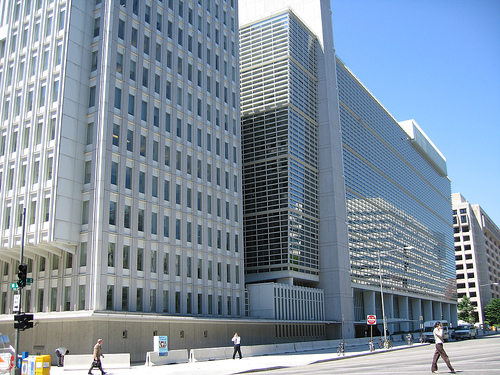 |
| World Bank Headquarters in Washington, DC [PHOTO: Shiny Things/CC BY 2.0] |
Washington: In a boost for global efforts to combat climate change and
tropical deforestation, Finland, Germany, and Norway have each announced new
financial contributions totaling approximately US$180 million to the Forest
Carbon Partnership Facility (FCPF), the World Bank administered facility that
was set up to compensate developing countries for reductions in carbon dioxide
emissions achieved by preserving their forests.
“Forests continue to be lost as efforts to get the world on
a greener, low-carbon growth path struggle to increase in speed and scale to
meet the climate challenges ahead,” said Rachel Kyte, World Bank Vice President
for Sustainable Development. “We are
therefore very pleased with the continued commitment of the donor community to
support FCPF’s groundbreaking work to curb forest loss.”
The new contributions to the FCPF bring the Facility’s
capitalization to approximately US$650 million and guarantee the continued
support for efforts by developing countries to reduce the loss of forest cover
and the associated emissions of greenhouse gases while preparing for
results-based payments.
“I am excited to see the Carbon Fund getting ready to pay
countries and large jurisdictions for verified emission reductions,” said Hans
Brattskar, Norway’s Special Envoy for International Climate Policy. “REDD+
needs to move from planning to large scale action already in this decade if we
are to maintain the two degree goal. The Carbon Fund will bring countries and
companies together to create early demand for forest carbon with strong
safeguards.”
The FCPF consists of two funds: The Readiness Fund (about
US$260 million) currently provides grant financing to countries to develop
their national strategies for reducing emissions from deforestation and forest
degradation (REDD+), and put in place the systems and institutions for
implementing these strategies. The Carbon Fund (US$390 million) will provide
payments upon verification that emissions have been reduced from large-scale
REDD+ programs undertaken in countries which have made progress in becoming
ready for REDD+.
“The additional German commitment is meant to be an
encouragement to all countries that recognize the many benefits of forests for
sustainable development, including local livelihoods, conservation of
biodiversity and climate mitigation,” said German Federal Minister for Economic
Cooperation and Development, Dirk Niebel. “This is why we are increasing
results-based support to those that are actively assuming responsibility for
halting and reversing forest loss in the crucial years before we hope to have
in place a global REDD+ mechanism in 2020.”
The majority of the new funds will go to the Carbon Fund,
the leading multilateral results-based REDD+ financial mechanism at scale. The
result will be larger incentives paid to developing forest countries until
2020. Norway is providing an additional NOK600 million (approximately US$100
million) to the Carbon Fund. Germany is contributing an additional EUR46.2
million to the Carbon Fund and EUR10.2 million to the Readiness Fund (a total
of approximately US$74 million). Finland
is contributing an additional EUR4 million to the Readiness Fund.
The FCPF Readiness Fund has been operational since 2008 and
the Carbon Fund since 2011. The FCPF brings together 54 countries and
organizations, including 36 forest countries and 18 financial contributors, to
support the implementation of REDD+ at the national level.


